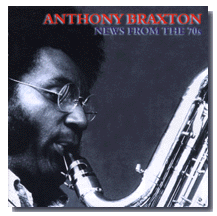
ANTHONY BRAXTON
News from the 70s
Felmay FY 7005
Recorded 1971-1976, Released 1999
1. Composition 23E (1974)
2. Composition 8C (1971)
3. Composition -1 (1972)
4. Composition -2 (1973)
5. Composition 8g (1971)
6. Four Winds (1976)
PERSONNEL
KENNY WHEELER; flugelhorn (1,4)
ANTHONY BRAXTON; sopranino, clarinet, piccolo, alto sax
DAVE HOLLAND; bass (1,3,6)
BARRY ALTSCHUL; percussion (1,6)
ANTOINE DUHAMEL; piano (4)
FRANCOIS MECHALI; bass (4)
GEORGE LEWIS; trombone (6)
There can be few jobs in the jazz world better than that of Francesco Martinelli, the Italian music journalist who was invited into Braxton's basement in 1996, where he came across a cardboard box of tapes from the 1970s that had never seen the light of day. From that box Martinelli curated this compilation of unreleased Braxton tracks. The album fulfils it's purpose as a document of Braxton's music in the mid 70s very well indeed, the tracks showing several aspects of his unique style.
Most exciting are the three tracks recorded in groups featuring the great Dave Holland, especially 'Composition -1' which is a duet between these two giants of free jazz. Elsewhere, there are two solo performances on alto by Braxton (compositions 8c and 8g), and a percussionless group ('Composition -2'). The music covers the breadth of Braxton's 70s output - the solo pieces are alternately firey and reflective, while the group improvisations are typically more intense. Notable amongst these is 'Composition 23E' - a piece dedicated to Albert Ayler that is certainly as intense as any in that great player's catalogue. After a haunting, tension filled opening section, backed by Holland's insistent, bowed bass, the band unleash a collective improvisation. Braxton in particular plays like a man posessed, with a power and sense of control that had seldom been seen in free jazz since the passing of John Coltrane. The fact that Braxton chooses to play this piece largely on soprano only serves to increase the similarities to Trane.
But simply aping Coltrane is not what Braxton is about; his compositions are musch more original than that, and the solo pieces are the places to see this best. Both are typically angular, with '8C' being a little calmer and more rounded than the jagged '8g'. Braxton was one of the first saxophonists to realise the potential of solo performance, and these riveting pieces of music are sure to convert sceptics everywhere.
The only piece to sound less than Braxton-ish is the closing Dave Holland composition, 'Four Winds'. A live version of the lead track on his seminal 'Conference of the Birds', Braxton plays a smaller part than elsewhere on the album. It's still a great piece of music though and fairly crackles along with some superb playing by Holland and a fine trombone solo courtesy of George Lewis.
As a retrospective of Braxton's 70s output for the committed fan there is plenty of meat here, but the record would also work well as a primer for those new to his music. One has to bear in mind that we're talking about unreleased, mostly live recordings, so the audio quality is not always as good as it could be, but any deficiencies in the sound are more than made up for by the content of the music. Highly reccommended.


No comments:
Post a Comment